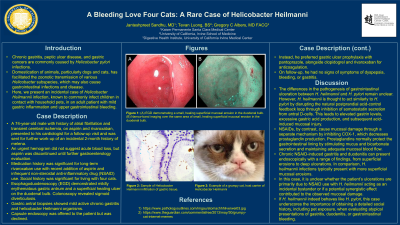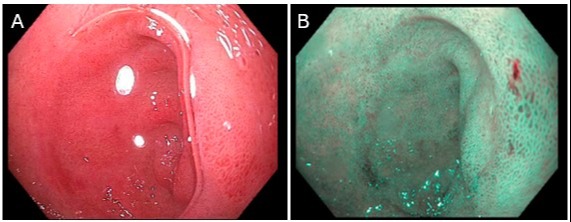Tuesday Poster Session
Category: GI Bleeding
P4190 - A Bleeding Love Four Cats: A Rare Case of Helicobacter heilmannii
Tuesday, October 29, 2024
10:30 AM - 4:00 PM ET
Location: Exhibit Hall E

Has Audio

Tevan Luong, BS
University of California, Irvine
Orange, CA
Presenting Author(s)
Janteshpreet Sandhu, MD1, Tevan Luong, BS2, C Gregory Albers, MD2
1Kaiser Permanente, Santa Clara, CA; 2University of California, Irvine, Orange, CA
Introduction: The majority of chronic gastritis, peptic ulcer disease, and gastric cancer cases are due to Helicobacter pylori. However, the domestication of animals such as dogs and cats has facilitated the zoonotic transmission of various Helicobacter species, which can also cause gastrointestinal mucosal diseases. Here, we present a case of an incidental Helicobacter heilmannii infection, resulting in mild gastric inflammation and upper gastrointestinal bleeding.
Case Description/Methods: A 74 year old male with a history of atrial fibrillation and transient cerebral ischemia, on aspirin and rivaroxaban, presented to his cardiologist for a follow-up visit. Incidentally, he reported a 2-month history of melena. An urgent hemogram did not suggest acute blood loss, but his aspirin was held until he could be evaluated by a gastroenterologist. No gastrointestinal symptoms were reported during this evaluation. He noted long-term use of rivaroxaban with recent addition of low-dose aspirin and infrequent NSAID use. Social history revealed he lives with four cats. An urgent esophagogastroduodenoscopy (EGD) showed a mildly erythematous gastric antrum and a superficial healing ulcer on the duodenal bulb. A colonoscopy showed mild sigmoid diverticulosis. Biopsies revealed Helicobacter heilmannii in the gastric tissue. The patient declined further evaluation with capsule endoscopy and opted for ulcer prophylaxis with pantoprazole, alongside clopidogrel and rivaroxaban for anticoagulation. At follow-up, he had no signs or symptoms of bleeding.
Discussion: The patient’s melena was thought to result from a duodenal ulcer likely caused by a combination of aspirin use and zoonotic infection of Helicobacter heilmannii from his cats. The superficial ulcers observed on EGD were not quite consistent with the deep, erythematous mucosal erosions typically seen in H. pylori infections or long-term aspirin use. Additionally, bleeding from potential hemorrhaging diverticulosis would be unlikely to cause melena. H. heilmannii, found in domestic animals, appears in less than 1% of human gastric biopsies. Studies have indicated significantly less gastric neutrophilic activity and gastric epithelial cell infiltration in patients with H. heilmannii compared to H. pylori infections, which may explain the patient’s borderline endoscopic findings. This case report highlights the importance of obtaining a thorough social history, especially concerning pets at home, to evaluate unusual presentations of gastritis and gastrointestinal bleeding.

Disclosures:
Janteshpreet Sandhu, MD1, Tevan Luong, BS2, C Gregory Albers, MD2. P4190 - A Bleeding Love Four Cats: A Rare Case of <i>Helicobacter heilmannii</i>, ACG 2024 Annual Scientific Meeting Abstracts. Philadelphia, PA: American College of Gastroenterology.
1Kaiser Permanente, Santa Clara, CA; 2University of California, Irvine, Orange, CA
Introduction: The majority of chronic gastritis, peptic ulcer disease, and gastric cancer cases are due to Helicobacter pylori. However, the domestication of animals such as dogs and cats has facilitated the zoonotic transmission of various Helicobacter species, which can also cause gastrointestinal mucosal diseases. Here, we present a case of an incidental Helicobacter heilmannii infection, resulting in mild gastric inflammation and upper gastrointestinal bleeding.
Case Description/Methods: A 74 year old male with a history of atrial fibrillation and transient cerebral ischemia, on aspirin and rivaroxaban, presented to his cardiologist for a follow-up visit. Incidentally, he reported a 2-month history of melena. An urgent hemogram did not suggest acute blood loss, but his aspirin was held until he could be evaluated by a gastroenterologist. No gastrointestinal symptoms were reported during this evaluation. He noted long-term use of rivaroxaban with recent addition of low-dose aspirin and infrequent NSAID use. Social history revealed he lives with four cats. An urgent esophagogastroduodenoscopy (EGD) showed a mildly erythematous gastric antrum and a superficial healing ulcer on the duodenal bulb. A colonoscopy showed mild sigmoid diverticulosis. Biopsies revealed Helicobacter heilmannii in the gastric tissue. The patient declined further evaluation with capsule endoscopy and opted for ulcer prophylaxis with pantoprazole, alongside clopidogrel and rivaroxaban for anticoagulation. At follow-up, he had no signs or symptoms of bleeding.
Discussion: The patient’s melena was thought to result from a duodenal ulcer likely caused by a combination of aspirin use and zoonotic infection of Helicobacter heilmannii from his cats. The superficial ulcers observed on EGD were not quite consistent with the deep, erythematous mucosal erosions typically seen in H. pylori infections or long-term aspirin use. Additionally, bleeding from potential hemorrhaging diverticulosis would be unlikely to cause melena. H. heilmannii, found in domestic animals, appears in less than 1% of human gastric biopsies. Studies have indicated significantly less gastric neutrophilic activity and gastric epithelial cell infiltration in patients with H. heilmannii compared to H. pylori infections, which may explain the patient’s borderline endoscopic findings. This case report highlights the importance of obtaining a thorough social history, especially concerning pets at home, to evaluate unusual presentations of gastritis and gastrointestinal bleeding.

Figure: Figure 1. (A) Esophagoduodenoscopy (EGD) demonstrating a small, healing superficial mucosal erosion in the duodenal bulb. (B) Narrow-band imaging on the same area of the small, healing superficial mucosal erosion.
Disclosures:
Janteshpreet Sandhu indicated no relevant financial relationships.
Tevan Luong indicated no relevant financial relationships.
C Gregory Albers: Nestle Health – Speakers Bureau. Phathom Pharmaceuticals – Speakers Bureau. Salix Pharmaceuticals – Speakers Bureau.
Janteshpreet Sandhu, MD1, Tevan Luong, BS2, C Gregory Albers, MD2. P4190 - A Bleeding Love Four Cats: A Rare Case of <i>Helicobacter heilmannii</i>, ACG 2024 Annual Scientific Meeting Abstracts. Philadelphia, PA: American College of Gastroenterology.
